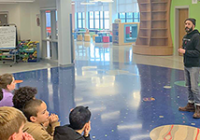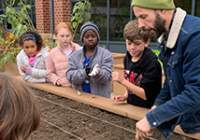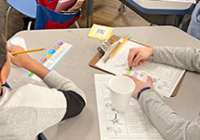Mindfulness, Teens and COVID
by Stephanie Goley, Calmer Choice
 In the wake of current uncertainty, you may find yourself living with a teen who may be struggling with the pandemic in ways you weren’t expecting. In “good times” the teenage years are angst-provoking, to say the least, and now that may be compounded by a situation that is out of anyone’s control. I think back to my own teen years and wish I had some of the tools then to be able to manage my emotions with more finesse. I did not “meet” mindfulness in my life until I was in my 30’s, and now I get to teach young people how to use it in their lives. Wow, what a difference it would have made to have these skills early on!
In the wake of current uncertainty, you may find yourself living with a teen who may be struggling with the pandemic in ways you weren’t expecting. In “good times” the teenage years are angst-provoking, to say the least, and now that may be compounded by a situation that is out of anyone’s control. I think back to my own teen years and wish I had some of the tools then to be able to manage my emotions with more finesse. I did not “meet” mindfulness in my life until I was in my 30’s, and now I get to teach young people how to use it in their lives. Wow, what a difference it would have made to have these skills early on!
The organization I teach for, Calmer Choice, was born on out of teen crisis here on Cape Cod in 2009. It was a response to support teens at a local high school that had experienced traumatic events including the devastating deaths of two classmates. Mindful awareness was triage for a horrible situation. And, it helped.
Now we know that giving children these tools, especially at a young age, can drastically improve their ability to self-regulate and respond to their emotions more effectively. In fact, we do it before the “trauma” even occurs. In schools that adopt our program, ALL students received our lessons- not just the ones who “need it.” Because, in reality, we all need it.
So, if you find yourself at home with a struggling teen, mindful awareness practice offers a way to experience life differently. The thing about mindfulness, though, is that it is a very personal practice. You can invite someone to participate in it- but they have to want to participate for it to have benefit. My first question for parents who are seeking to help their children with mindfulness is, “Do you practice mindfulness yourself?” And if the answer is no, then I’m sure you can guess what the first step is going to be. We cannot ask our kids to be practicing something that we do not practice ourselves, and we cannot advocate for the benefits of such if we really have no knowledge of what it can do.
 1. Awareness- This seems like a simple thing- but it’s not always easy. Awareness of what is happening in the present moment with the mind and body can sometimes reduce the panic and anxiety that comes with situations out of our control. Tuning into the body sensations as we notice worry, frustration and anger begin to creep in can ground us in the moment. We all experience these emotions, and doing so is not a bad thing. Teens may experience emotions that change moment to moment in good times due to social pressure, hormonal changes, and stress. With the pandemic looming the emotional roller coaster may be going non-stop. So, pause, check in, notice what’s happening in the body and mind in response to what we take in. If it’s a constant news stream of death tolls and ventilator shortages, notice how that affects the body and mind.
1. Awareness- This seems like a simple thing- but it’s not always easy. Awareness of what is happening in the present moment with the mind and body can sometimes reduce the panic and anxiety that comes with situations out of our control. Tuning into the body sensations as we notice worry, frustration and anger begin to creep in can ground us in the moment. We all experience these emotions, and doing so is not a bad thing. Teens may experience emotions that change moment to moment in good times due to social pressure, hormonal changes, and stress. With the pandemic looming the emotional roller coaster may be going non-stop. So, pause, check in, notice what’s happening in the body and mind in response to what we take in. If it’s a constant news stream of death tolls and ventilator shortages, notice how that affects the body and mind.
Also, are people in your home getting short with each other? Here’s an example of how it could play out. After friction in the house has died down, revisit the situation by talking with your teen. “I noticed that you and your sibling were pretty irritated with each other earlier today. You sounded really angry. It can be hard to be spending all this time so close together and without our friends. (pause, listen) What did you notice happening in your body when you two were arguing? (pause, listen) I wonder if you might notice the next time your body starts to feel like that? When it does, what else do you think you may be able to do instead of yelling at each other? (pause, listen).” Some suggestions may be to pause, take 3 breaths, or walk away.
Allow it to be- After awareness comes allowing. Things are out of our control right now. As adults we are feeling the difficulty of this time, and for a teen navigating a life that may already seem out of control, this pandemic might be over the top. Acknowledging this difficulty and the emotions that come with it, while allowing it to be as it is, may help more than pushing away the unpleasant feelings. Part of this allowing is letting go of the judgment we may have about how we feel. Just observing the feelings as they come and go, noticing what fear feels like, what frustration feels like, or anxiety can take some of the power out of them. Remembering that emotions come and go like the weather and is part of the human experience may help us to not get so caught up in the storminess ourselves when our family members are experiencing a challenging moment, day, or week. Bringing in some compassion – perhaps with a hug or a warm smile – can remind our teens that they are not alone in this experience and that what they are feeling is part of being human.

2. Connect- Despite the locational closeness we may be experiencing with teens in our homes, the emotional closeness and connection may be lacking. Trying to connect with a struggling teen sometimes feels like trying to get to know a brick wall, but small steps can move things forward. Forcing a reticent teen to “open up” might be faced with anything from silence to fits of rage. What is important to your teen? What lights up their world? Can you connect is some small way with something they love? Being honest about your own emotions can sometimes be an opening for connection with a teen. Asking to connect with them on their terms will go a long way in getting them to participate. Remembering, as well, that this may be a particularly challenging time for many teens as developmentally this is a time when they are forming their identity and their peers are a key component in doing so. They bounce ideas off of one another, they observe how their actions are received by peers, they adjust accordingly. With a dramatic shift in the manner in which they are able to interact with friends, many teens may be feeling the absence of this essential component to teenage development.
In the meantime, it is important for us as parents and loved ones to remain gentle in our own hearts to our teen’s experience. The absence of their peers may feel far more significant for them at this time than it does for adults who have already developed their self-identity. For some teens, this may also be a break from social pressure which could also bring some relief. Let them know how much you love them (even if they are testing your patience daily)! Offer a hug. Give space – and don’t take it personally if they do not want to hang out very often.
 3. Take in the good- Gratitude for small things in our life can have a dramatic effect on our mood, health and well-being. When we appreciate what we love as a practice it can actually rewire our brains toward positivity. This also seems simple, yet not always easy. There needs to be an intention to cultivate this type of practice in your life regularly for it to be “installed.” A gratitude journal is one way to start this practice. Start by writing down a couple of things each day that bring you joy- and also why. The why is an important step in deepening the effect of gratitude practice. In addition to gratitude, there is good happening all around us if we choose to take it in. Our human minds are conditioned to search for the negative as a means of self-preservation, so taking in the good needs to be a conscious choice. With access to a seemingly unlimited supply of online content- spend some time watching videos of cute puppies, bloopers, hilarious pranks and comedians. Laughter should not be underestimated. If journaling isn’t your thing, talking about your gratitude has a similar effect.
3. Take in the good- Gratitude for small things in our life can have a dramatic effect on our mood, health and well-being. When we appreciate what we love as a practice it can actually rewire our brains toward positivity. This also seems simple, yet not always easy. There needs to be an intention to cultivate this type of practice in your life regularly for it to be “installed.” A gratitude journal is one way to start this practice. Start by writing down a couple of things each day that bring you joy- and also why. The why is an important step in deepening the effect of gratitude practice. In addition to gratitude, there is good happening all around us if we choose to take it in. Our human minds are conditioned to search for the negative as a means of self-preservation, so taking in the good needs to be a conscious choice. With access to a seemingly unlimited supply of online content- spend some time watching videos of cute puppies, bloopers, hilarious pranks and comedians. Laughter should not be underestimated. If journaling isn’t your thing, talking about your gratitude has a similar effect.
Now, more than ever, the opportunities for teens (and adults) to get involved with mindfulness training online are numerous- and many are FREE offerings. If you have a teen who is curious and willing to try out mindful awareness the resources are available. I would also encourage any parent who wants this for their child to be curious about investigating what it looks like for themselves.
Our go to parenting resources on teens:
- Breathe Through This by Eline Snell https://www.elinesnel.com/en/eline-snel-3/
- Brainstorm by Dan Siegel https://www.drdansiegel.com/books/brainstorm/
For more information about Calmer Choice and the services we offer, please visit www.calmerchloice.org.












This Post Has 0 Comments